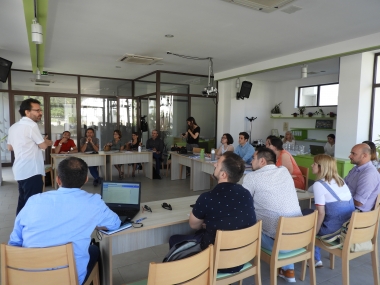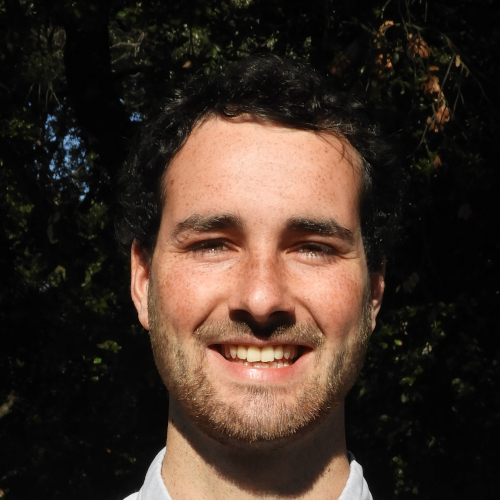Biocanteens: a trigger for Troyan's agri-food project
Edited on
06 November 2019For several years, Troyan's municipality has been developing an ambitious agri-food local strategy. While joining BioCanteens transfer network and hosting a transnational meeting in July 2019, the bulgarian city showed a strong commitment.

A political long-term strategy:
At the end of 2013, the Troyan Municipal Council adopted the Municipal Development Plan of the Municipality for the period 2014-2020. The Municipal Development Plan follows the EU-set guidelines laid down in the Europe 2020 Strategy, whose flagship initiatives are related to:
- Prioritizing the development of organic farming;
- Balanced agricultural development;
- Support for young farmers;
- Environmental conservation and conservation activities.
The leading initiatives have also been reflected in the Municipal Development Plan of Troyan Municipality, through its strategic objectives, priorities and concrete projects. Those strategic objectives focus on the stimulation of the local economy and highlight the competitive advantages of local potential, the improvement of living standards and the sustainable employment, affecting the income of the population.
The specific projects envisaged for realization of the priority are aimed at:
- Support for the development of traditional activities, including organic farming, livestock farming and others;
- Associate local businesses to enhance their competitiveness, including businesses processing agricultural and animal products;
- Partnership with the Research Institute for Mountain Livestock and Agriculture (RIMSA).
A Memorandum of Understanding was signed between RIMSA and the Municipality of Troyan for the elaboration of a project proposal under the Procedure BG05M2OP001-1.003 "Establishment of Regional Science Centers" under the "Smart Growth Science and Education" Operational Program 2014-2020 year.
The main tasks of the project proposal are related to:
- Creation of perennial plantations of different fruit species for the conditions of the Balkan region;
- Selection of plum and apple varieties suitable for organic production in Balkan region;
- Development of elements of technologies for creation of plantations from some berry and fruit crops under the conditions of the Balkan region;
The development of a system for own production of vegetables and fruits for delivery of fresh organic products for the children and students on the territory of the municipality is another goal to be achieved in the pursuit of a better living environment in the municipality.
The Municipality of Troyan has opportunities and resources for that, but an operational process for the realization of this innovative approach is needed.
A strong support from BioCanteens:
The Municipality of Troyan is very impressed by the main goals of the Biocanteens’ project that is jointly implemented together with six other European cities. Therefore, the experience and the mechanism that the Lead Partner Mouans-Sartoux possesses gives us possible solutions for the implementation of their model on the territory of Troyan.
The common objective aspires to develop a system for raising nutrition standards and promoting environmentally-friendly nourishment in the canteen’s menu. That is going to be achieved by creating own vegetable production and fruits and delivering fresh organic products to children and students on the territory of the municipality.
The initial implementation steps that the Municipality has taken, opened a new horizon of prospects, however, we faced some restricts and limits as well. Precisely, the issue with making the orders – Public Procurement.
Public procurement: a key issue at the core of Troyan’s transnational meeting:
The working session began with a review of the Food Educational Micro-Good practices – “quick wins” that are easy to implement in the situation of the local context. The project partners exchanged and discusses the practices from their cities and then made a selection of the most relevant ones according to some criteria. Here the final aim of the project deliverable is to produce a complete catalogue together with the Kitchen Micro-Good practices that is going to be a helpful resource for the kitchen staff and the educational animators. Some examples include:
- Food/ water tasting activities
- Thematic lunch
- Lunch with the cook
- School gardens

The program of the visits included the first Municipal action towards unification of the menu and healthy eating habits towards the youngest population – the Baby Food Kitchen. The kitchen staff cook and distribute meals for babies from 10 months to 3-years-old. The kitchen does not have a social, nor economical aspect when allocating its meals. The idea is that young (and/or ordinary) mothers obtain healthy nutritional meals, executed by providing wholesome and varied food, daily consumption of vegetables and fruits, sufficient intake of milk, dairy products and other protein-rich foods, increasing consumption of whole grains, limiting fat, sugar and salt intake. In this way, we can monitor the quality of the food that the babies receive.
Following the visit, the partners took the opportunity to meet and talk with the Mayor of the municipality – Mrs. Donka Mihaylova. The half-an-hour appointment provided a field for many questions and clarifications in regard to the short and long-term goals of the Head of the Municipality.
Mrs. Mihaylova explained that we are taking actions that are progressively going in direction of acquiring healthy eating lifestyle. Taking into account the Baby-Food Kitchen and the newly created Central Kitchen (which provide meals for kindergarteners) that covers meals for kids from 10-months old to 7-years-old, we are now working on the establishment of a municipal farm that is going to produce organic fruits (apples and plums for the beginning) and vegetables for the kitchen. On the long-term list of duties, we have the meal preparation for the school canteens as well. What is more, the Municipality is taking care of the oldest part of the population – the retired people.

The fundamental point of the whole Transnational Meeting came with the Skype meeting with John Watt – an Ad Hoc expert on Sustainable Public Procurement for collective catering. His saying, “Sustainable procurement is not just about buying preferable goods at good prices, but about the whole impact on the local authorities” gave a new perspective on the sustainable procurement. The booklets of the presentation gave a clear standpoint of the possibilities when arranging the whole procedure. It was interesting to learn point like:
- planning the procedure
- the engagement of the supplier
- choosing the procedure
- selection, award criteria and clauses
- some legal considerations
The case studies provided, gave a clear idea of what is possible and doable in the context of making a public order. Hence, the workshop on Public Procurement was really useful and all of the partners reached a point where it is up to us to push the Public Procurement Departments to work hard for the sake of the children and their healthy eating. We were answering a questionnaire and that is how the common problems were spotted. Therefore, we discussed how we can help each other with handling the issue.
Troyan’s municipal farm platform:
The partners also visited one of the kindergartens in Troyan. In our kindergartens children between 3 to 7 years old are spending a day between 8 a.m. and 18 a.m. They have breakfast, snack, lunch and late breakfast, as well as different educational and physical activities and last but not least, they rest well and sleep a few hours after lunch.
Another place on the visit list was the Central Kitchen in “Bukovets” Kindergarten. It was a pleasure to introduce the new facility and equipment to the project partners. After we showed them around, we had a Q&A session on the spot. After that the presentation of Troyan’s farm platform was made.

Our fresh part of the project is almost brand new apple garden to which we took the partners. It looks like the trees are doing very well and the first fruits will be a fact very soon. As the head of the urban planning said “An apple per day, keeps the doctor away”. We truly believe in those words.
A strong connection with local stakeholders:
We visited TEHRA. The closest big company near the city. TEHRA is a Bulgarian company established in 1992 that has rich history and traditions. The company is a leading Bulgarian manufacturer of raw materials working in the food industry and targeting sectors as milling factories, bread and confectionary producers.
Main activities of the company are manufacturing and trading of products such as: traditional, specialized and wholegrain flours, mixes for bread and confectionery products. In the product range, TEHRA has also ready-to-use flour based mixes for making of bread and confectionary products at home.
The company`s production base is located close to village called Lomets, in the municipality of Troyan, with the usage of modern equipment, mechanized and automated technological processes.

After two and a half days of hard-working sessions, extreme storm situation and open-air group discussion sessions, the project partners promoted new ideas and perspectives on Public Procurement that will have a positive effect on the making the next order.
Contacts:
Teresa Georgieva: teresageorgey@gmail.com
Nadezhda Terziyska: n.taslakova@gmail.com
 Submitted by Nathan Begoc on
Submitted by Nathan Begoc on
